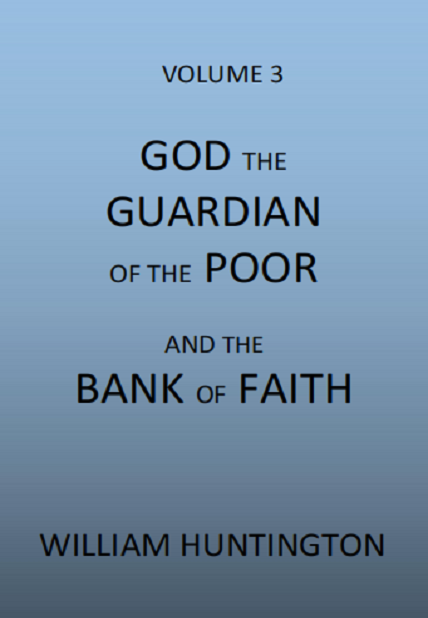By William Huntington.

GOD the Guardian of the Poor, and the Bank of Faith.
Volume 3
By William Huntington.
About the writer:
William Huntington S.S. (1745–1813) was an influential English preacher known for his strict Calvinist theology and unorthodox style.
Born William Hunt in Cranbrook, Kent, he grew up in poverty as the tenth child of Elizabeth Hunt, enduring a difficult childhood marked by hunger and hardship. Despite minimal formal education, Huntington developed a deep understanding of Scripture, attributing his spiritual insight to divine guidance. In 1769, he adopted the surname Huntington, symbolizing his transformation into a “vessel of the Lord.”
Initially working as a coal heaver, gardener, and coach driver, Huntington experienced a vision in 1773 that he believed marked his divine calling. He began preaching in Surrey and Middlesex, drawing audiences with his fiery sermons and uncompromising belief in predestination. Huntington’s charismatic preaching led to the founding of numerous chapels, including the renowned Providence Chapel in London, attracting both commoners and aristocrats.
Despite his popularity, Huntington’s outspoken theology and criticism of mainstream clergy sparked frequent conflicts. Nevertheless, his works, such as The Bank of Faith, and his enduring chapels solidified his legacy as a self-made preacher who relied solely on God’s providence.
About the book:
God the Guardian of the Poor or, The Bank of Faith by William Huntington is a compelling exploration of the author’s personal reliance on divine providence in the face of poverty and hardship. First published in 1785, the book serves as both a spiritual autobiography and a theological treatise, illustrating Huntington’s unwavering belief that God directly intervenes in the lives of His chosen people to meet their needs.
Drawing from his own experiences, Huntington recounts numerous instances where he believed God provided for him in miraculous ways, often through unexpected acts of generosity. These anecdotes form the foundation of his “Bank of Faith,” a metaphorical account that believers can draw upon by trusting in God’s promises. The book emphasizes themes of prayer, trust, and the sufficiency of God’s grace, presenting Huntington’s life as a testament to the biblical principle, “The Lord will provide.”
Through vivid storytelling and fervent theological reflection, Huntington challenges readers to cultivate absolute faith in God’s provision, even in the most dire circumstances. The work resonated deeply with his contemporaries, especially among the working class, and remains an enduring example of 18th-century Calvinist spirituality and practical faith.